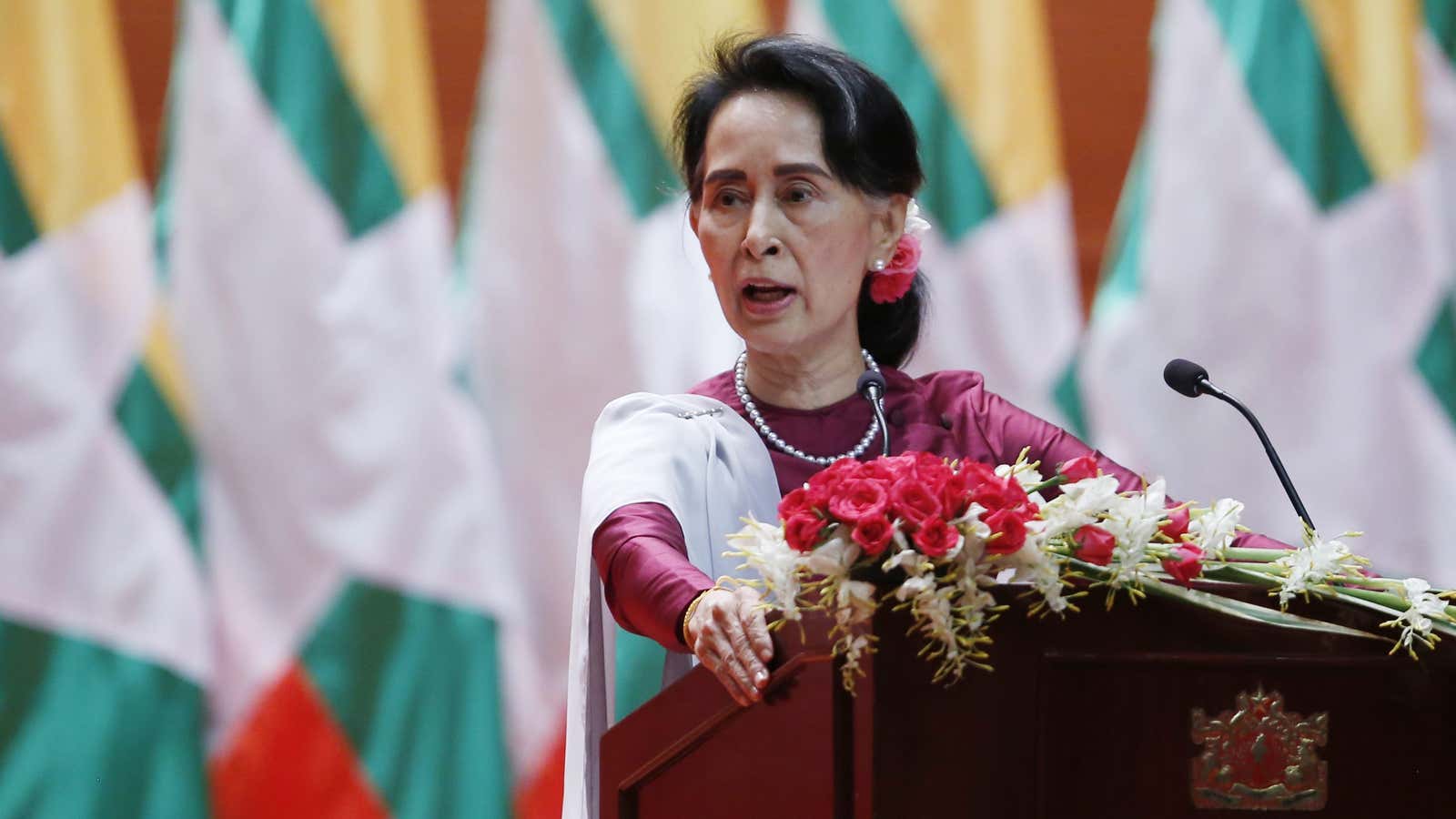Myanmar is committed to peace and harmony, the Rohingya refugees are welcome to return home, and the international community doesn’t see the full picture of what is happening in the country—those were the main takeaways from a major speech delivered by state counsellor Aung San Suu Kyi Tuesday (Sept. 19) on the deepening Rohingya crisis that has drawn international condemnation of Myanmar and the Nobel peace laureate.
“I’m aware of the fact that the world’s attention is focused on the situation in Rakhine state,” said Suu Kyi, speaking in English in the capital Naypitaw.
By the latest UN estimates, over 400,000 Rohingya have fled Myanmar for neighboring Bangladesh in recent weeks. The wave of refugees started to flee Myanmar when an armed Rohingya group attacked police stations in Rakhine state in late August, which was followed by a military reprisal that saw villages set on fire. Refugees arriving in Bangladesh have said security forces have shot and stabbed civilians.
Speaking just before the United Nations General Assembly kicks off in New York, UN secretary general Antonio Guterres told the BBC Monday (Sept. 18) that the speech would be Suu Kyi’s “last chance” to stop the military’s offensive against the Rohingya group. Suu Kyi, who leads the country’s ruling party but is constrained by the power of the military in Myanmar, stopped short of condemning the army’s actions in her speech—or from acknowledging the kind of abuses that refugees are reporting.
She said that the Myanmar army has been instructed to “adhere strictly to a code of conduct” and “exercise all due restraint” to avoid harming innocent civilians. Despite extensive media reports and satellite photos showing the deliberate burning of villages in the country’s western Rakhine state, where most Rohingya reside, Suu Kyi said, ”we have to make sure those allegations are based on solid evidence before we take action.” She added that there have been no armed clashes since Sept. 5.
The Nobel laureate stated her commitment to peace and tolerance in the country repeatedly, but sought to contextualize the Rohingya problem amid a larger picture of Myanmar as a complex and young democracy.
“After half a century or more of authoritarian rule, now we are in the process of nurturing our nation,” she said in remarks that were broadcast on Facebook, with the sound inexplicably muted.
The democracy icon, whose party won a landmark election in 2015 following decades of military rule, said it was unfair for the international community to expect a new democracy like Myanmar to overcome its problems in “as short a time as possible,” and that it was “sad” that the international community only zeroed in on the Rohingya problem amid myriad problems in the country.
The Rohingya, many of whom have lived in Myanmar for generations, have been long persecuted in Buddhist-majority Myanmar. Many in the country refuse to use the term “Rohingya” to refer to the group, and choose to use the term “Bengali” instead to signal their otherness from the rest of the Burmese population. Suu Kyi herself has said she doesn’t use either term because they are “emotive” and divisive terms.
Set apart by religion and language, the appearance of a Rohingya Muslim militant group is also leading to new epithets being applied to the community as a whole: terrorists and extremists.
Suu Kyi said she was “concerned to hear that numbers of Muslims are fleeing across the border to Bangladesh,” and that she will endeavor to “find out why” the exodus is happening, but also repeatedly drew attention to the fact that many Rohingya Muslims have chosen not to flee. In some villages in Rakhine, Rohingya who remain say that they face intimidation from Buddhists, and have asked for safe passage to help them flee.
“It is very little known that the great majority of Muslims in the Rakhine state have not joined the exodus. More than 50% of the villages of Muslims are intact, they are as they were before the attacks took place,” said Suu Kyi, as she invited diplomats in Myanmar to go and “study the peaceful areas” for themselves. The Rakhine Commission, headed by former UN secretary general Kofi Annan, which submitted its final report just two days before the new violence, has noted that access to many parts of the state is highly restricted to both aid agencies and the media.
On the question of repatriating refugees from Bangladesh, Suu Kyi said she is firmly committed to the citizenship process for Rohingya, as enshrined in a 1993 agreement between the two countries, and is ready to start the verification process of refugees “at any time.” That’s likely to be a problematic process—in Myanmar, over a million Rohingya are denied basic citizenship rights and are forced to self-identify as “Bengali.” According to an earlier report (pdf, p11) from the Annan-led commission, only some 2,000 Rohingya have been granted Myanmar citizenship to date. Many refuse to take part in the verification process, said the report, because of a lack of information, a “lack of tangible benefits” for those who are given citizenship, and a rejection of the need to self-identify as “Bengali.”
Suu Kyi added that the government “feels deeply” for everyone caught up in the conflict in Rakhine state, but added that many smaller ethnic groups, such as Hindus—of “whose presence most of the world is totally unaware”—have also had to flee. In another attempt to skirt the gravity of the current crisis facing the Rohingya specifically, Suu Kyi said that the government was committed to the rights not of a particular group, but “the rights of all human beings.”
If Suu Kyi is indeed caught between a rock and a hard place in balancing her commitment to democracy and human rights with her political career in Myanmar, that wasn’t evident from the language of her speech—indeed, she doubled down on Myanmar’s position, and said the country “doesn’t fear international scrutiny.”
She should be prepared for much more of that.
